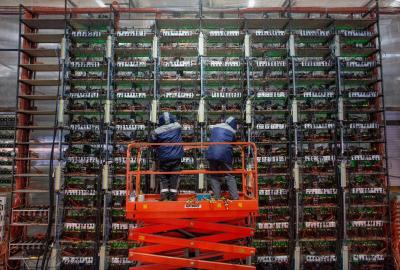Under the title "A Battle for Control in the $2 Trillion Cryptocurrency Market," Bloomberg Asharq published news about the cryptocurrency market worldwide. The site stated, "It is not that governments like China are banning cryptocurrencies because they necessarily expect the technology to fail. They want to be in charge of an experiment that could potentially be worth trillions of dollars."
With its latest move, China joins a small list of countries that have banned cryptocurrencies, a swing in the opposite direction from El Salvador, which adopted Bitcoin as legal tender this year, praised by proponents of libertarianism and Bitcoin believers. In the United States, where trading cryptocurrencies is permitted, although regulators are taking a closer look, some see an opportunity in China's crackdown on the rising market.
Cryptocurrency Craze
In a tweet, Senator Pat Toomey wrote: "China's authoritarian crackdown on cryptocurrencies, including Bitcoin, represents a significant opportunity for the United States and serves as a reminder of our vast structural advantages over China." Understanding the many dimensions of this multifaceted battle for market control will be essential for millions of investors hoping to capitalize on the cryptocurrency craze.
The battle is set to resonate throughout the global financial system, with daily news about financial products like Bitcoin exchange-traded funds (ETFs), oddly named tokens, and non-fungible tokens (NFTs). Wealthy individuals are also participating, as major financial institutions embrace cryptocurrencies.
Bitcoin miners are roaming the globe in search of "shelter" and energy sources. More broadly, the battle will also influence social and cultural discussions on everything from climate change to inequality and from trade to fiat currencies. The performance of the world’s two largest economies—the United States and China—is likely to have a far-reaching impact as they aim to regulate the market.
Matt Hogan, Chief Investment Officer at Bitwise Asset Management, stated, "Cryptocurrencies have become too big to ignore." He added, "Five years ago, at least in the minds of regulators, people were wearing hoodies, playing Dungeons & Dragons, and trading among themselves. Today, it's a $2 trillion industry, and every major bank on Wall Street is helping investors gain exposure to it, and they now have to deal with it."
Cryptocurrency Regulations
China disrupted financial markets this week by announcing that all cryptocurrency-related transactions will be deemed illegal. This reflects less decisive measures dating back to 2013, which took strict actions against initial coin offerings (ICOs), cryptocurrency exchanges, and mining, in which China became a global leader. Instead, the Chinese government aims to unleash its digital currency.
It is one of 81 countries exploring their own digital currencies, a list that started with early adopters like Venezuela and Estonia, but now includes larger nations, including China with its 1.4 billion residents. This is likely to give China an advantage when it begins to roll out its digital currency, the yuan, globally at the Winter Olympics in Beijing in 2022—a potential that has made some American politicians want to ban American athletes from using the cryptocurrency while there.
Coinbase's Battle with the SEC Raises the Cost of the Crypto War in Washington
Nicholas Christin, an assistant professor at Carnegie Mellon University, stated, "For China, it is clear that they want to promote the digital yuan and are simply concerned with competition." China announced that 10 regulatory agencies, including the central bank, will work together to track cryptocurrency-related activities. Under the ban, foreign exchanges are even prohibited from providing services to mainland Chinese investors.
Randall Kroszner, Deputy Dean of the Booth School of Business at the University of Chicago and former chairman of the U.S. Federal Reserve System, noted that the country’s moves over the past few years have already impacted trade volumes locally, adding, "Even with the use of Virtual Private Network (VPN) services, internet access can be extremely challenging."
Hogan from Bitwise said that governments are taking a hardline stance against cryptocurrencies for two reasons; firstly, they want to curb cryptocurrency mining, which is an energy-intensive computing process involved in creating cryptocurrencies and validating transactions. The second reason—perhaps more importantly—is that they want to be able to monitor currency transactions and eliminate any challenge to their local digital currencies.
Gary Gensler's Approach
In the United States, the government's regulatory strategy has been different. This approach aims to avoid problems, according to Christin from Carnegie Mellon. For example, financial markets have historically imposed high barriers to entry for certain types of transactions, but there are no such strict controls for trading cryptocurrencies. This leaves the door open for inexperienced investors to take on highly leveraged trades that could lead to catastrophic financial losses.
Christin stated, "Now, of course, there is a school of thought that people should be able to do what they want because, after all, it's their own money." "But the question is whether many individual investors involved in these markets are actually qualified to assess the risks rationally rather than engaging in gambling-like behavior."
Does El Salvador's Adoption of Bitcoin Eliminate the Future of Cryptocurrencies?
U.S. Securities and Exchange Commission Chairman Gary Gensler, who has referred to cryptocurrency as the "Wild West," emphasizes the need for a robust regulatory system in the sector. A planned lending program by Coinbase Global Inc., which would allow users to earn interest through lending their cryptocurrencies, has been a bright spot in the escalating tensions between the regulator and the sector.
Zac Prince, CEO of BlockFi, recently stated, "The SEC and other regulators need to clarify for the sector what is permissible." In fact, Gensler has been interested in the world of cryptocurrencies for years, having taught a relevant course at MIT's Sloan School of Management called "Supply Chain and Money." He has even pointed to a path for the SEC to approve an ETF that tracks Bitcoin futures contracts.
Regulatory caution is understandable, especially after scammers have siphoned billions of dollars through pump-and-dump schemes in cryptocurrencies, employing countless tactics to lure unsuspecting investors. James Seyffart, an analyst at Bloomberg Intelligence, noted, "The government is concerned about consumer protection," adding that the U.S. government generally does not ban new technology but typically embraces innovation. There will be new regulatory frameworks, but they just need to provide guidance to the public.
Former U.S. Treasury Secretary Lawrence Summers stated that instead of resisting regulations, the cryptocurrency sector should embrace them in its own interest. In an interview on Bloomberg Television, Summers explained that given the substantial sums involved in the cryptocurrency market, it is unrealistic for the sector to expect to operate in secrecy without government oversight, clarifying that the cryptocurrency sector must abandon the notion that it will operate as a "freedom paradise," free from regulatory rules.




